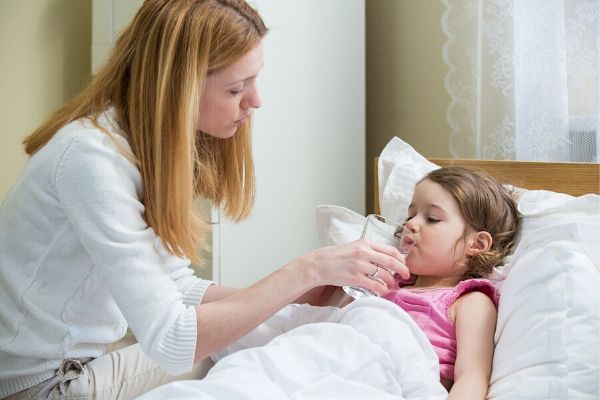 It’s easy to feel helpless when your kid is sick, but you don’t have to!
It’s easy to feel helpless when your kid is sick, but you don’t have to!
While fevers have a scary reputation, they are usually safe and actually help your child fight illness. We’ll explore this by answering some common questions. Before we begin, the below advice is for children older than 2 months of age – if a child younger than 2 months-old has a fever, they MUST see a doctor.
Fevers and Kids
What is a fever?
A fever is your body’s natural response to fighting an infection. It means your child’s immune system is working!
What is the cutoff for a fever?
Your body’s temperature fluctuates throughout the day, meaning many “low-grade” fevers can actually be normal. Above 100.4°F or 38.0°C is an official fever.
What is the best way to check a temperature?
Rectal and oral are the most accurate, followed by under the arm, then forehead thermometers. Feeling your child’s head is not a good way to check their temperature. You can feel warm for many reasons, but it may not actually reflect the body’s temperature. Studies have shown parents and even nurses cannot accurately guess who has a fever by feeling foreheads.
Can a fever be harmful?
The temperature itself is almost never harmful. Keep in mind a fever means your child’s body has just changed its thermostat to a higher setting. This higher setting helps your child fight illness. Your body will not set its thermostat too high – even as high as 104-105°F is safe if your body has created it. This is very different from having a fever due to outside warmth, like becoming dehydrated in the summer heat, which can be harmful.
What can be harmful about a fever are the things that come with it – elevated heart rates, elevated respiratory rates and increased fluid losses. If the underlying reason for your child’s fever is a respiratory cause, the additional work of breathing from a fever may be too much.
When should I treat a fever?
You can treat any fever that is making your child uncomfortable or worsening their underlying illness (like the breathing example above). Most children will feel worse when they have a fever, so it is never wrong to make them more comfortable. That being said, if your child is comfortable and not having any worsening effects of the fever, you don’t have to treat it. Alternatively, if your child is uncomfortable and doesn’t have a fever, medications may still help them feel better. Think more about treating how your child is feeling, than the temperature reading.
What is the best way to treat a fever?
The most effective way to treat a fever is with medications like acetaminophen (Tylenol) if older than 2 months or ibuprofen (Motrin) if older than 6 months. You can even use both of these at the same time, but alternate their use during the course of treatment. Children should never take aspirin. These treatments should make your child more comfortable and reduce the temperature by a couple degrees – it may not go away completely and that is ok!
When should I see a doctor?
You should see a doctor if the symptoms your child is experiencing besides the fever are causing a problem. Examples include dehydration from vomiting/diarrhea, difficulty breathing, lethargy that doesn’t improve when the fever is gone, etc. You should also see a doctor if your child has had a fever for several days and does not seem to be improving. While most fevers in children are caused by viruses which will improve on their own, if they are not getting better it may indicate a bacterial infection, which needs treatment with antibiotics.
Additionally, infants younger than 2 months of age and anyone who is immunocompromised should ALWAYS see a doctor for a fever. Infants do not always show the symptoms of what exactly is making them sick. A fever in this age group needs further evaluation.
About the Author
 Dr. Chloe Butler is a hospital-based pediatrician at MercyOne Children’s Hospital in Des Moines. She provides care for healthy newborns in the first few days of life as well as sick kids in the hospital up until age 18.
Dr. Chloe Butler is a hospital-based pediatrician at MercyOne Children’s Hospital in Des Moines. She provides care for healthy newborns in the first few days of life as well as sick kids in the hospital up until age 18.
Connect with MercyOne Des Moines Medical Center
Website: MercyOne.org/desmoines
Twitter: @MercyOneDSM
Facebook: @mercyonedesmoines
Instagram: @mercyonedesmoines
Pinterest: @MercyOneDesMoines
The post is part of a series of sponsored posts by MercyOne Des Moines Medical Center

















